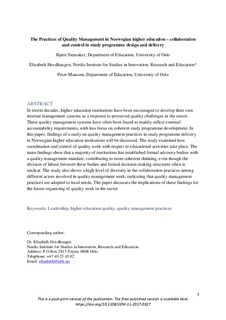| dc.contributor.author | Stensaker, Bjørn | |
| dc.contributor.author | Hovdhaugen, Elisabeth | |
| dc.contributor.author | Maassen, Peter | |
| dc.date.accessioned | 2019-05-15T10:37:57Z | |
| dc.date.available | 2019-05-15T10:37:57Z | |
| dc.date.created | 2019-04-23T14:25:43Z | |
| dc.date.issued | 2019 | |
| dc.identifier.citation | Stensaker, B., Hovdhaugen, E. & Maassen, P. (2019). The practices of quality management in Norwegian higher education: Collaboration and control in study programme design and delivery. International Journal of Educational Management, 33(4), 698-708. | nb_NO |
| dc.identifier.issn | 0951-354X | |
| dc.identifier.uri | http://hdl.handle.net/11250/2597669 | |
| dc.description.abstract | Purpose: In recent decades, higher education institutions have been encouraged to develop their own internal management systems as a response to perceived quality challenges in the sector. These quality management (QM) systems have often been found to mainly reflect external accountability requirements, with less focus on coherent study programme development. The purpose of this paper is to explore the relationship between QM practices and study programme delivery in Norwegian higher education institutions.
Design/methodology/approach: The study examined how coordination and control of quality work with respect to educational activities take place, using data from a survey to study programme leaders in a large sample of Norwegian higher education institutions.
Findings: The main findings show that a majority of institutions have established formal advisory bodies with a QM mandate, contributing to more coherent thinking, even though the division of labour between these bodies and formal decision-making structures often is unclear. The study also shows a high level of diversity in the collaboration practices among different actors involved in QM work, indicating that QM practices are adapted to local needs.
Originality/value: The paper provides new knowledge as to how QM is conducted in practice at the local level. It nuances earlier studies by showing the involvement of collegial bodies in QM although such bodies may have unclear mandates and, thus, an unclear role in the QM process. | nb_NO |
| dc.language.iso | eng | nb_NO |
| dc.publisher | Emerald | nb_NO |
| dc.subject | Leadership | nb_NO |
| dc.subject | Quality management practices | nb_NO |
| dc.subject | Higher education quality | nb_NO |
| dc.title | The practices of quality management in Norwegian higher education: Collaboration and control in study programme design and delivery | nb_NO |
| dc.type | Journal article | nb_NO |
| dc.type | Peer reviewed | nb_NO |
| dc.description.version | acceptedVersion | nb_NO |
| dc.source.pagenumber | 698-708 | nb_NO |
| dc.source.volume | 33 | nb_NO |
| dc.source.journal | International Journal of Educational Management | nb_NO |
| dc.source.issue | 4 | nb_NO |
| dc.identifier.doi | 10.1108/IJEM-11-2017-0327 | |
| dc.identifier.cristin | 1693492 | |
| dc.relation.project | Norges forskningsråd: 237960 | nb_NO |
| cristin.unitcode | 7463,0,0,0 | |
| cristin.unitname | NIFU Nordisk institutt for studier av innovasjon, forskning og utdanning | |
| cristin.ispublished | true | |
| cristin.fulltext | postprint | |
| cristin.qualitycode | 2 | |
